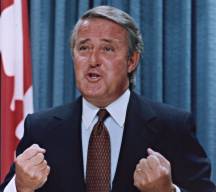The Meech Lake Accord was a set of failed amendments to the Constitution of Canada negotiated in 1987 by Prime Minister Brian Mulroney and the provincial premiers, including Robert Bourassa, premier of Quebec. It was designed to persuade Quebec to endorse the Canada Act.
 Prelude
PreludeThe accord was negotiated at a meeting between Mulroney and provincial premiers at Willson House at Meech Lake in the Gatineau Hills in 1987.
a recognition of the province of Quebec as a "distinct society"
a constitutional veto for Quebec
increased provincial powers with respect to immigration
extension and regulation of the right for a reasonable financial compensation to any province that chooses to opt out of any future federal programs
provincial input in appointing senators and Supreme Court judges Opposition
As the deadline approached, however, the consensus began to unravel. Pressure from voters at home brought many premiers, especially those in the Western provinces, under fire. The Accord became an issue in some provincial elections, as New Brunswick elected the Liberal government of Frank McKenna, which revoked the previous government's approval of the Accord. Newfoundland Premier Clyde Wells would soon do likewise.
With a matter of months before the Accord deadline, a commission led by prominent Tory Jean Charest recommended some changes to the Accord. This prompted Lucien Bouchard, environment minister, and also chief Quebec lieutenant, under Mulroney, and others to leave the Progressive Conservatives. Eventually, they, and several disenchanted Liberals formed the federal Bloc Québécois party.
Arguably, the most pressure was on Quebec Premier, Robert Bourassa. To many Quebecers, the Accord was the bare minimum acceptable. Any weakening of the Accord would undermine Bourassa's position and possibly bring a large backlash from Quebec.
This prompted a first ministers conference on June 3, 1990 (20 days before the deadline of the Accord). After a week of negotiations, an agreement for further rounds of constitutional negotiations was devised to follow ratification of Meech Lake. All 10 premiers again signed the "new" Accord, although Wells said that he would have to consult with the people of Newfoundland before committing to the Accord.
The agreement promised:
During the meeting, Wells echoed the feelings of many in the country:
New Brunswick soon accepted the Accord, and Frank McKenna toured the nation to drum up support.
In Manitoba, however, things did not go as planned. With many First Nations protesters outside, the Legislative assembly convened to approve the Accord. Unanimous support was needed to bypass the necessary public consultation, and MLA Elijah Harper raised an eagle feather to mark his dissension. Harper opposed bypassing consultation because he did not believe First Nations had been adequately involved in the Accord's process.
Even though a legal route was found to give Manitoba more time (the deadline would be extended three months, with Quebec being able to re-approve the Accord), Clyde Wells and Opposition leader Thomas Rideout agreed to cancel the planned free vote in the Newfoundland House of Assembly, because the outcome would have most likely been a refusal. The Accord was officially dead.
A commitment to Senate reform by July 1, 1995. The proposed Senate would be elected, "effective" (having power over most bills), and be more representative of the other provinces. If a unanimous agreement was not made, the Senate would convert to Quebec having 24 seats, Ontario having 18, Prince Edward Island with 4, and all other provinces with 8 seats.
A guarantee to not weaken gender equality.
To give the Territories the power to nominate Senators and Supreme Court justices.
Future conferences on Aboriginal and minority language issues.
Later discussions on a "Canada Clause", how new provinces would be formed, and a new amending procedure. Aftermath
Le Mouton noir (documentary film)
Distinct society
No comments:
Post a Comment